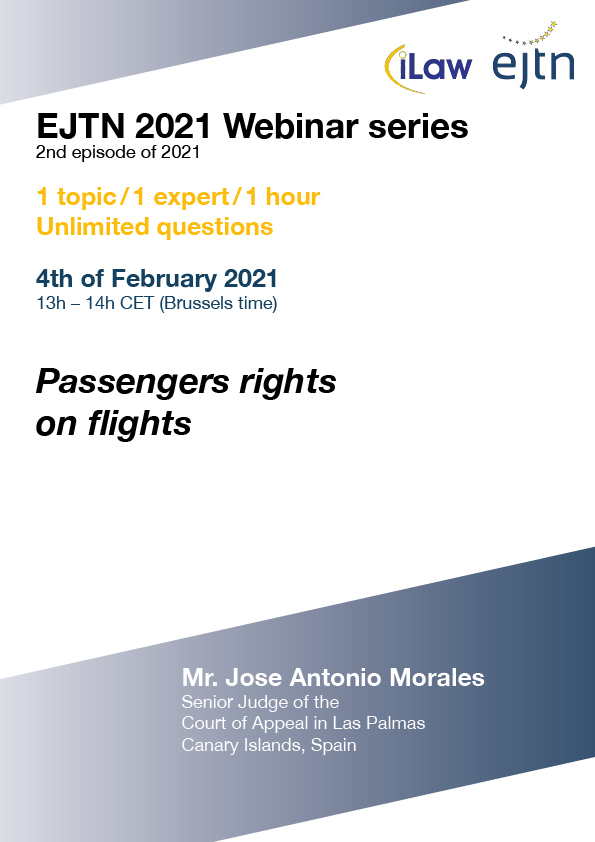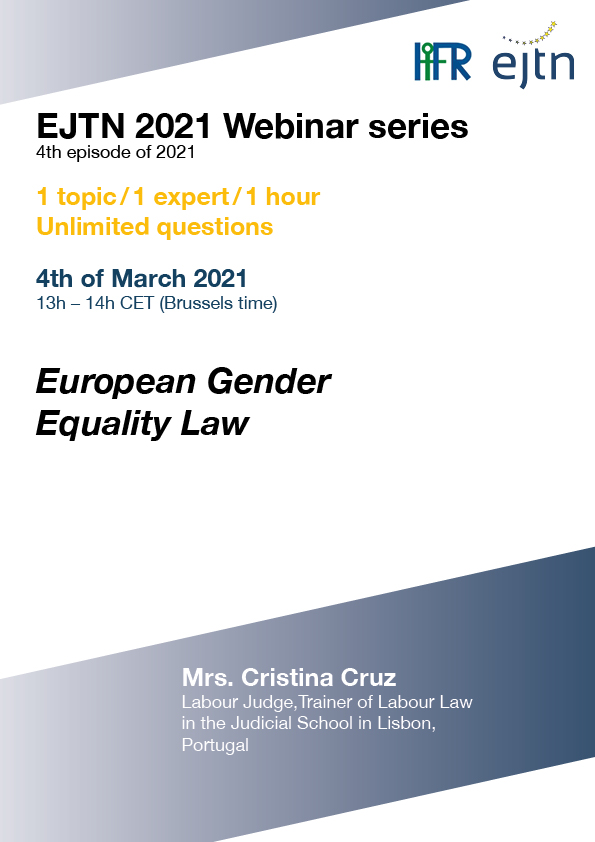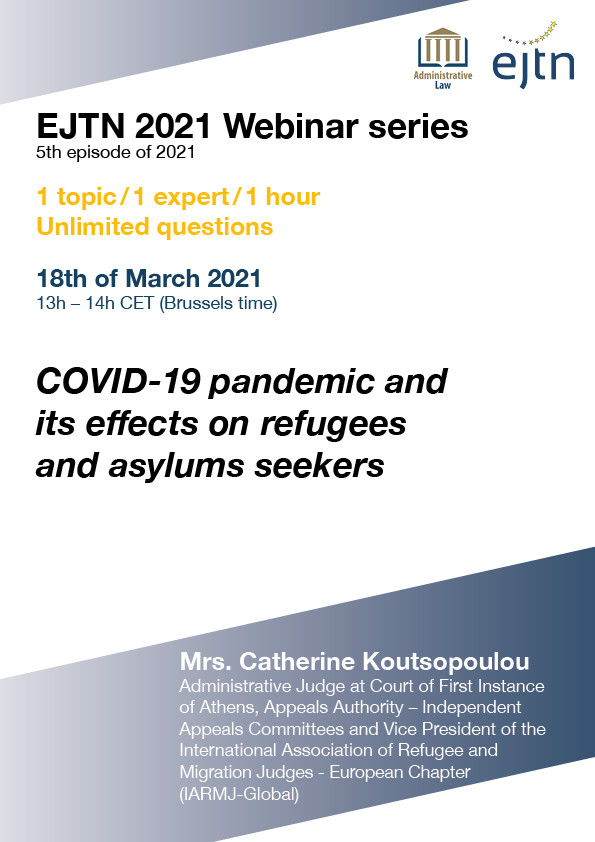We are pleased to launch the next 4 EJTN webinars of the series 1 hour lunchtime webinars in the format 1 topic/1 expert/1 hour to be implemented within (1)Civil Law, (2)Criminal Law, (3)Human Rights and Fundamental Freedoms, and (4) Administrative Law Portfolios on 4th February, 18th February, 4th March and 18th March 2021 respectively.
- No formal application.
- No selection process.
- No national quota foreseen in these webinars.
- All webinars will be composed of a short introduction and a 30 minutes presentation.
- You will have the opportunity to ask questions in the Q/A session.
- The link to the Microsoft Teams platform is posted under each event.

Topic: Passengers rights on flights
Speaker: Senoir JudgeJose Mr. Antonio Morales – Senior Judge of the Court of Appeal in Las Palmas Canary Islands, Spain
Date: 4th of February, 13h-14h CET (Brussels time)
Content:
- European legal framework: Regulation (EC) No 261/2004 establishing common rules on compensation and assistance to passengers in the event of denied boarding and of cancellation or long delay of flights.
- Interpretative Guidelines on Regulation (EC) No 261/2004.
- The Court of Justice of the European Union and the rights of air passengers.
Main target group: Civil Judges but not exclusively; prosecutors interested in the topic.
Learning outcomes: Upon the successful completion of this webinar, participants will achieve an overall picture of “passengers rights on flights” through an approach of the legal structure of the matter, the criteria dictated for its interpretation as well as the treatment of the CJEU on the matter in an understandable and summarized way in the established time.
Click here: Click here to join the meeting

Topic: Balancing the rights of the defendant and the victim - challenges and opportunities
Speaker: Judge Mrs. Svetoslava Koleva, Judge at Court of Appeal Varna, member of national network for international cooperation in criminal matters, lecturer at National Institute of Justice
Date: 18th of February, 13h-14h CET (Brussels time)
Content: The webinar will explore how best to balance and enhance the rights of both victims and defendants to ensure the effectiveness and efficiency of criminal proceedings. Balance between the rights of the defendant and the rights of victims of crime – competition or symbiosis in ensuring a fair trial? The answer to this question presented through the eyes of the legal practitioner, called upon to find modern solutions to the challenges to achieve this balance in an adversarial procedure.
Main target group: Judges and prosecutors
Learning outcomes: Upon the successful completion of this webinar, participants will be able to outline some of the key elements of fair trial in an attempt to help the criminal judge choose the procedural means appropriate to the particular case so as to ensure both the accused person and the victims the specific rights recognized to them by EU law and to avoid a breach of Article 6 of the ECHR. The practical importance and need for such training, especially focusing on protecting the victims' rights is explicitly recognized and encouraged in the EU Strategy on victims' rights (2020-2025), in line with the objectives of which is also the current webinar.
Click here to join the Microsoft Teams Meeting.

Topic: European Gender Equality Law
Speaker: Labour Judge Mrs. Cristina Cruz, Trainer of Labour Law in the Judicial School in Lisbon, Portugal
Date: 4th of March 2021, 13h-14h CET (Brussels time)
Content: Overwiew of EU gender equality legislation as interpreted by the CJEU (recent case law):
- Essential concepts of direct and indirect discrimination
- Pregnancy and pay discrimination on grounds of sex in the context of employment and occupation
- The principle of equal treatment between man and woman engaged in an activity in a self-employed capacity
Main target group: Judges, prosecutors and other members of the EU judiciary
Learning outcomes: Upon the successful completion of this webinar, participants will be able to understand the scope of application of the Charter in the field of gender equality and the personal scope of protection in the gender equality Directives. Some Court of Justice of the European Union case law and European Court of Human Rights case law will be update.
Click here to join the Microsoft Teams Meeting.
PRESENTATION CRISTINA CRUZ - European Gender Equality Law

Topic: COVID-19 pandemic and its effects on refugees and asylums seekers
Speaker: Administrative Judge Mrs. Catherine Koutsopoulou – Court of First Instance of Athens, Appeals Authority – Independent Appeals Committees and Vice President of the International Association of Refugee and Migration Judges - European Chapter (IARMJ-Global)
Date: 18th of March 2021, 13h-14h CET (Brussels time)
Content: Two of the core instruments of the CEAS are the Reception Conditions Directive (recast) and the Asylum Procedures Directive (recast) that aim to provide adequate and comparable reception conditions throughout EU and establish common procedures for granting and withdrawing international protection, respectively. For this purpose, the Reception Conditions Directive provides for non-material reception conditions such as schooling, employment, and health care, and material reception conditions such as housing, food and clothing. On the other hand, the Asylum Procedures Directive guarantees the access to the asylum procedure, the conduct of personal interviews, legal assistance and the right to a fair trial.
The outbreak of the COVID-19 pandemic obliged MS to take emergency measures in order to ensure public safety. These policies, consisted mainly of general measures on confinement and social distancing, had resulted in affecting people worldwide, among which, one of the most vulnerable groups, the refugees and the asylum seekers. As EU+ countries have been affected by COVID-19 to varying levels, measures implemented in response to the ‘force majeure’ in asylum and reception systems also differed in nature, intensity and scope in time.
During the lunch webinar we will explore the new tools and processes in asylum and reception systems since the COVID-19 outbreak. We will discuss on their impact on the asylum applicants, their conformity with the CEAS acquis, and how Courts had tackled this new situation and we will also try to identify whether we are in the dawn of a new “asylum reality” and how this new reality can reinforce asylum seekers rights.
Learning outcomes: Upon the successful completion of this webinar, participants will be able of analysing problems posed by the application of the emergency measures and identifying good practices for a future asylum policy.
Click here to join the Microsoft Teams Meeting.
PRESENTATION: Mrs. Catherine Koutsopoulou